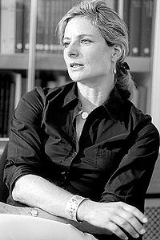
theoretical physicist and a leading expert on particle physics
and cosmology
. She works on several of the competing models of string theory
in the quest to explain the fabric of the universe. Her most well known contribution to the field is the Randall-Sundrum model
, first published in 1999 with Raman Sundrum
. She was the first tenured woman
in the Princeton University
physics department and the first tenured female theoretical physicist at both MIT and Harvard University
.
The universe has its secrets. Extra dimensions of space might be one of them. If so, the universe has been hiding those dimensions, protecting them, keeping them coyly under wraps. From a casual glance, you would never suspect a thing.![]()
We certainly don't yet know all the answers. But the universe is about to be pried open.![]()
When I was in school I liked math because all the problems had answers. Everything else seemed very subjective.
![]()
Sometimes I have a sense of what I'm seeing being a small fraction of what's there. Not always there, but probably more often than I realize. Something will come up, and I'll realize I'm thinking about the world a little differently than my friends.
![]()
In the history of physics, every time we've looked beyond the scales and energies we were familiar with, we've found things that we wouldn't have thought were there. You look inside the atom and eventually you discover quarks. Who would have thought that? It's hubris to think that the way we see things is everything there is.
![]()
If we don't do it now, we'll probably never do it. We've built up the technology; we're at a point where if we don't continue, we'll lose that expertise, and we'll have to start all over again. True, it's expensive, but at the end of the day I believe it will be worth it. It makes a difference in terms of who we are, what we think, how we view the world. These are the kinds of things that get people excited about science, so you have a more educated public.
![]()
Science is not religion. We're not going to be able to answer the "why" questions. But when you put together all of what we know about the universe, it fits together amazingly well.
![]()
Religion asks questions about morals, whereas science just asks questions about the natural world. But when people try to use religion to address the natural world, science pushes back on it, and religion has to accommodate the results. Beliefs can be permanent, but beliefs can also be flexible. Personally, if I find out my belief is wrong, I change my mind. I think that's a good way to live.
![]()

